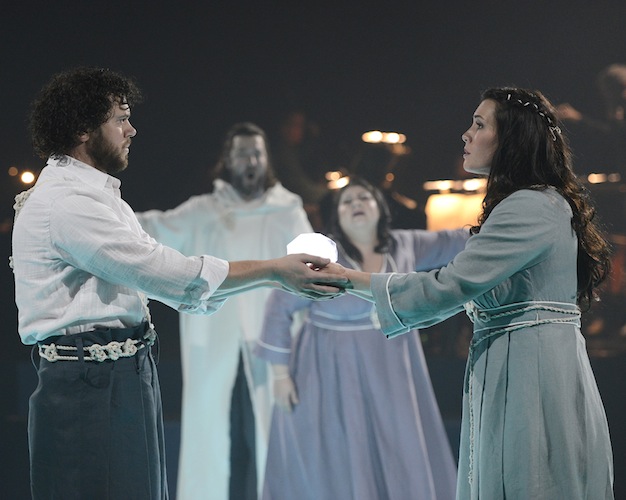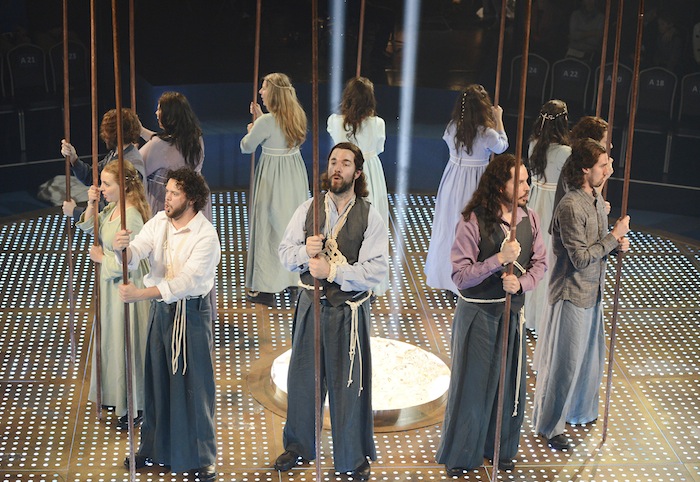Opera Review: Boston Lyric Opera’s Powerful “Love Potion”
With its Opera Annex productions – presenting unfamiliar operas in unconventional performance spaces – Boston Lyric Opera really seems to have found its niche.
The Love Potion. Music by Frank Martin. Staged by the Boston Lyric Opera at Temple Ohabei Shalom, 1187 Beacon Street, Brookline, MA, through November 23.

Jon Jurgens (Tristan) and Chelsea Basler (Isolt) holding hands during the BLO production of “The Love Potion.” Photo: Eric Antoniou.
By Jonathan Blumhofer
You’ve got to hand it to Boston Lyric Opera (BLO): when it does things right, it does them very well, indeed. Take this week’s production of Frank Martin’s rarely-heard Le vin herbé, presented in a new English translation by Hugh Macdonald and retitled The Love Potion. A retelling of the Tristan myth, BLO’s absorbing new production at Brookline’s Temple Ohabei Shalom features handsome singing, plus direct, uncluttered staging. The relative intimacy of the temple works in its favor, too, giving the proceedings a fervency not always encountered in a larger theater.
Wagner’s Tristan und Isolde may pack more heat, but Martin’s version – which, in its entirety, lasts only about twenty minutes longer than just the first act of Wagner’s – benefits from tighter storytelling. Its characters are in some ways more human. And the music, while generally lacking the sensuous lyricism found in Wagner’s great opera, emphasizes the differences between the versions of the story each composer told.
Martin’s hews closer to the medieval narrative than does Wagner’s. It is the potion alone – drunk by mistake, not swapped out by the nurse, Brangain – that is responsible for the love between Tristan, one of King Mark’s trusted knights, and Isolt the Fair, the King’s betrothed. When they’re found out, they flee to the woods and experience some fleeting happiness together. King Mark discovers them but spares their lives after seeing that they have remained chaste. The summary guilt they feel at being allowed to live drives them apart: Isolt back to the King, Tristan to Brittany and the arms of Isolt of the White Hands. After being wounded in combat, Tristan wants only to see Isolt the Fair so that she might heal him; his wife, though, tricks him into believing that his beloved won’t come and he dies. But Isolt the Fair does come, embraces Tristan’s body, and joins him in death. A short epilogue reveals the connection, in death, between lovers.
Part of The Love Potion’s directness comes from the immediacy of its musical language. Martin’s score is tonal but lushly chromatic. It doesn’t shy away from gnarled, dissonant instrumental textures. At the same time, it is unashamedly lyrical and features plenty of ostinato patterns after the model of Stravinsky. Martin draws some colorful effects from his small orchestra (seven strings plus piano), but the overall impressions one takes away from the score derive from the tightness of its musical quality – not a note seems to be wasted – and its resulting emotional probity.
Vocally, nothing is superfluous. The Love Potion is cast for a dozen singers who, in the ancient tradition, function as a Greek chorus while also portraying the characters. And the casting of BLO’s current production, as heard on Thursday, was consistently strong.
As Tristan, tenor Jon Jurgens sang with ardency and passion. This role – and staging – put Jurgens through his paces as a dramatic actor and singer perhaps more than some. He acquitted himself well, ably expressing the character’s vulnerability and humanity, ultimately revealing a sympathetic Tristan, one torn between his loyalty to his King and his illicit love for Isolt.
In Martin’s retelling, Isolt has a bit less to do than in Wagner’s. And, in this production, that’s a pity because Chelsea Basler, who sang Isolt the Fair, is just the type of singer to whom you want to spend an entire evening listening. She has a lovely voice and a beautiful, consistent tone across her range. And she brought an intensity to her role that was perfectly calibrated for this week’s performance space. Keep your eyes on her.
Also keep your eyes on Rachel Hauge, whose brief appearance as the duplicitous Isolt of the White Hands made you wish she had been given more to sing alone. Hauge seemed to revel in her turns as the villain, singing with clear power and a solid tone that was laced with not a little bit of steel. Strong, too, were Michelle Trainor, as the fiery, remorseful Brangain, and Heather Gallagher, as Isolt’s Mother. Among the men, David McFerrin imbued King Mark with warmth and nobility, while David Cushing made a stentorian, well-rounded Duke Hoël.

The chorus in the BLO’s production of “The Love Potion.” Photo: Eric Antoniou.
David Schweizer’s direction took advantage of the straightforward stage: a circular platform placed in the center of the audience. Long pipes depicted a ship, cottage, and weapons; white ropes a stormy sea. The relative anonymity of the cast – all appeared initially in white robes before the individual characters stepped out – reinforced the timelessness of the story’s moral, which was also aided by the chorus’s closing commentary. So, too, did the best staged moment of the opera: the long-held first kiss between Tristan and Isolt that continued while the chorus sang of the tragedy that would follow the pair. Robert Wierzel’s lighting was generally subtle, illuminating various portions of the stage to represent a ship, the forest, and so forth. It added richly to the mystery and beauty of the production.
Indeed, the only real disappointment of the evening – and it was periodic, at that – was the instrumental ensemble, which was played by a chamber group drawn from BLO’s orchestra. Much of the time it delivered Martin’s restrained, chant-like accompaniment satisfactorily, but, at several climactic points, the playing, especially of the upper strings, would have benefited from greater confidence, expressive passion, and better intonation. Even so, the low strings consistently sounded strongly and Brett Hodgdon brought out a wealth of color from the keyboard. David Angus conducted a performance that moved along naturally and, especially considering the setting (the orchestra was often behind the singers and coordinated by video monitors surrounding the stage), was notable for the precision of the whole ensemble.
With its Opera Annex productions – presenting unfamiliar operas in unconventional performance spaces – BLO really seems to have found its niche. The Love Potion, in addition to providing a first-rate theatrical experience, offers the opportunity to encounter a haunting score by a great 20th-century composer whose output has, in the forty years since his death, been largely, and undeservedly, neglected. Is this just the latest sign that there’s a healthy desire and audience for the fringes of the operatic repertoire in, of all places, Boston? Given the success of this and recent Opera Annex undertakings, not to mention the advent of Odyssey Opera, you could be excused for so thinking.
Jonathan Blumhofer is a composer and violist who has been active in the greater Boston area since 2004. His music has received numerous awards and been performed by various ensembles, including the American Composers Orchestra, Kiev Philharmonic, Camerata Chicago, Xanthos Ensemble, and Juventas New Music Group. Since receiving his doctorate from Boston University in 2010, Jon has taught at Clark University, Worcester Polytechnic Institute, and online for the University of Phoenix, in addition to writing music criticism for the Worcester Telegram & Gazette.
Tagged: Boston-Lyric-Opera, David Angus, Frank Martin, Harlow Robinson, The Love Potion, Tristan myth
